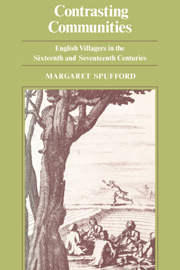Book contents
- Frontmatter
- Contents
- List of maps and graphs
- List of tables
- List of abbreviations
- Acknowledgements
- Dedication
- Introduction
- Map 1 Cambridgeshire: natural boundaries and soil types
- Map 2 Cambridgeshire: county and parish boundaries
- PART 1 People, Families and Land
- PART 2 The Schooling of the Peasantry
- PART 3 Parishioners and their Religion
- 9 Dissent before and after the commonwealth
- 10 A general view of the laity in the diocese of Ely
- 11 Fragmentation and the growth of sects
- 12 The possible determinants of dissent
- 13 The reality of religion for the villager
- Conclusion
- Appendix 1 The Butlers of Orwell
- Appendix 2 Notes on Graphs 3 and 5
- Index of Contemporary Names
- General Index
12 - The possible determinants of dissent
Published online by Cambridge University Press: 25 January 2010
- Frontmatter
- Contents
- List of maps and graphs
- List of tables
- List of abbreviations
- Acknowledgements
- Dedication
- Introduction
- Map 1 Cambridgeshire: natural boundaries and soil types
- Map 2 Cambridgeshire: county and parish boundaries
- PART 1 People, Families and Land
- PART 2 The Schooling of the Peasantry
- PART 3 Parishioners and their Religion
- 9 Dissent before and after the commonwealth
- 10 A general view of the laity in the diocese of Ely
- 11 Fragmentation and the growth of sects
- 12 The possible determinants of dissent
- 13 The reality of religion for the villager
- Conclusion
- Appendix 1 The Butlers of Orwell
- Appendix 2 Notes on Graphs 3 and 5
- Index of Contemporary Names
- General Index
Summary
It has become fashionable to attempt to account for the distribution of religious phenomena by explaining them in terms of the social and geographical backgrounds in which they flourish or wither away. There is no doubt much merit in this approach. It can also lead to oversimplification of an extraordinarily naive kind. The Indian geographer Kuriyan, for instance, has accounted for the readiness with which Christ's disciples followed him by pointing out that ‘the fishermen of Galilee were nomadic by virtue of their occupation. Fishing was a haphazard business, and hence their readiness to uproot themselves and chance the integrity of a wandering teacher.’ On the other hand, ‘The men of Nazareth were patient cultivators… like all cultivators they were rooted to the soil, and could rarely move away from their homes as the land has to be constantly tended. The horizon of their minds was limited to the walls which shut in their corner of the earth, and by nature, they were against novelty and change.’ Few converts were there-fore made in Nazareth.
Much more subtle arguments have recently been advanced by Professor Everitt for the distribution of nonconformity in country parishes in England in more recent times. Basically, he suggests that dissent could flourish in large parishes, mainly in fen and forest regions where manorial control was weak, in boundary areas, or in decayed market towns, where control was likewise weak.
- Type
- Chapter
- Information
- Contrasting CommunitiesEnglish Villages in the Sixteenth and Seventeenth Centuries, pp. 298 - 318Publisher: Cambridge University PressPrint publication year: 1974



